7 Best Herbal Tinctures For Bad Breath
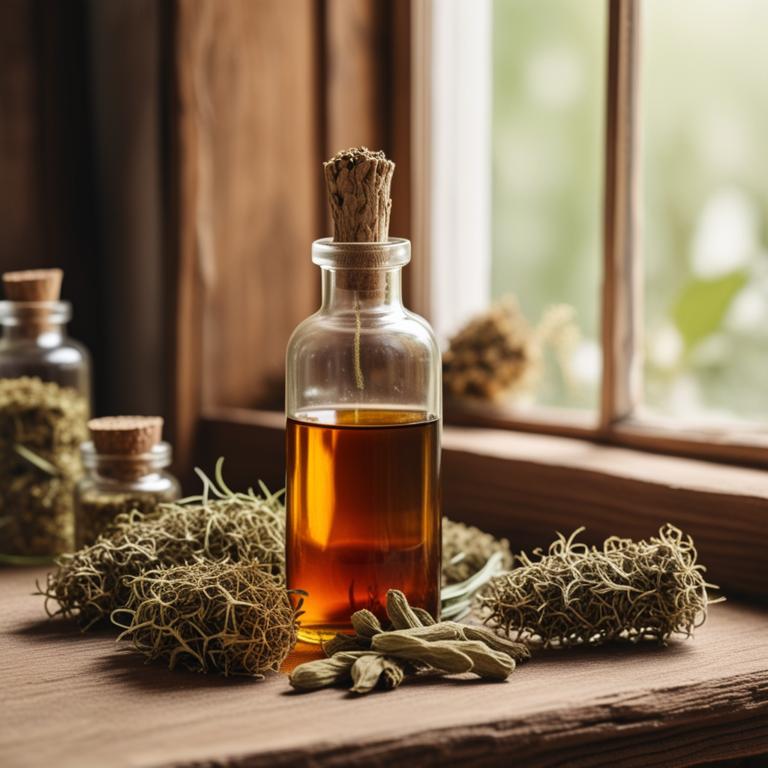
Herbal tinctures for bad breath are highly concentrated liquid extracts of plants used to treat halitosis, a persistent and unpleasant odor of the breath.
These natural remedies have numerous benefits, including their non-invasive and non-addictive nature, making them a safer alternative to conventional treatments.
Examples of herbal tinctures that can help alleviate bad breath include peppermint, which helps reduce inflammation and kill bacteria in the mouth, as well as parsley, which has antibacterial properties that combat the growth of odor-causing microorganisms.
Other effective herbal tinctures for bad breath include clove, which has antimicrobial properties, eucalyptus, which helps reduce inflammation and ease congestion, and myrrh, which has anti-inflammatory properties that soothe and heal gum infections.
According to "Quintessence international (Berlin, Germany : 1985)", tinctures for bad breath may be effective, particularly those made from echinacea and lavender, as they were found to be the most effective in reducing malodor production in a study examining various natural medicinals.
Below there's a list of the 7 best herbal tinctures for bad breath.
- 1. Thymus vulgaris tinctures
- 2. Satureja montana tinctures
- 3. Cinnamomum zeylanicum tinctures
- 4. Mentha x piperita tinctures
- 5. Melissa officinalis tinctures
- 6. Origanum vulgare tinctures
- 7. Eucalyptus globulus tinctures
Also you may be interested in...
TODAY'S FREE BOUNDLE
Herb Drying Checklist + Herbal Tea Shopping List + Medicinal Herbs Flashcards
Enter you best email address below to receive this bundle (3 product valued $19.95) for FREE + exclusive access to The Aphotecary Letter.
$19.95 -> $0.00
1. Thymus vulgaris tinctures
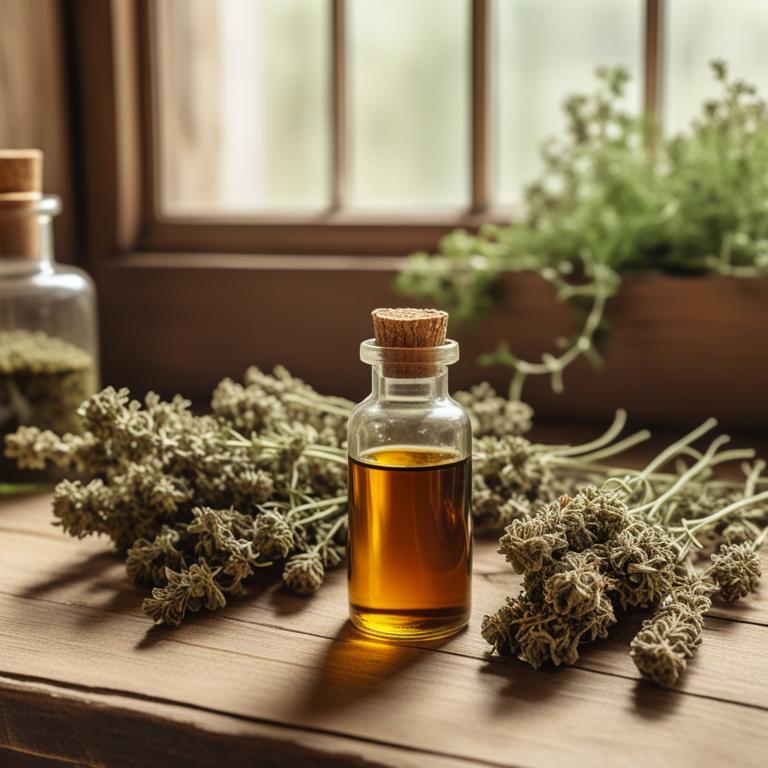
Thymus vulgaris tinctures, derived from the leaves of the thyme plant, have been traditionally used to treat bad breath due to their antimicrobial and antibacterial properties.
The bioactive constituents, such as thymol and carvacrol, help to combat the growth of bacteria in the mouth, thereby reducing the odor-causing compounds.
By inhibiting the production of volatile sulfur compounds, thymus vulgaris tinctures can effectively alleviate halitosis, providing a refreshing breath and improved oral health.
The benefits of using thymus vulgaris tinctures for bad breath include their natural and non-invasive approach, ease of use, and the ability to promote a healthy oral environment.
Related Study
According to "Ceska a Slovenska farmacie : casopis Ceske farmaceuticke spolecnosti a Slovenske farmaceuticke spolecnosti", Thymus vulgaris tinctures can be used for bad breath due to its antibacterial and antiseptic effects, which can help in the treatment of respiratory tract diseases, including upper respiratory tract catarrh.
2. Satureja montana tinctures
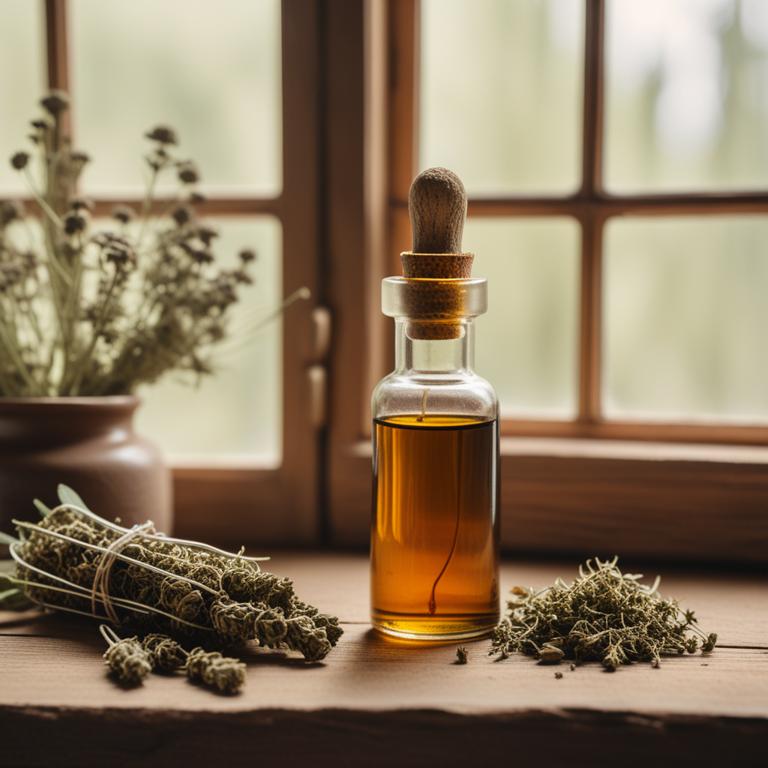
Satureja montana tinctures have been traditionally used to treat bad breath, also known as halitosis, due to their potent antibacterial and anti-inflammatory properties.
The bioactive constituents of Satureja montana, such as carvacrol and thymol, exhibit broad-spectrum antimicrobial activity, helping to reduce the growth of bacteria in the mouth that cause bad breath.
By inhibiting the production of volatile sulfur compounds and reducing inflammation in the oral cavity, Satureja montana tinctures help to alleviate bad breath and promote a healthy oral microbiome.
The benefits of using Satureja montana tinctures to treat bad breath include reduced symptoms, improved oral health, and a fresher, cleaner mouth.
Related Study
According to this study, Satureja montana tinctures were one of the 36 herbal medicines used by the indigenous people of North Waziristan, Pakistan to treat halitosis (bad breath).
3. Cinnamomum zeylanicum tinctures
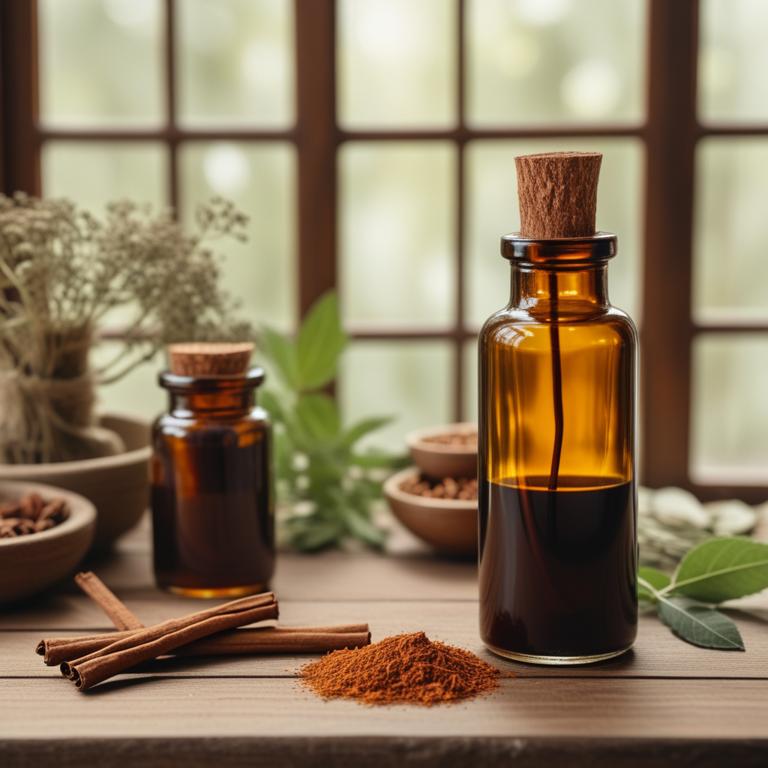
Cinnamomum zeylanicum tinctures have been traditionally used to treat bad breath, also known as halitosis, due to their antibacterial and anti-inflammatory properties.
The tinctures of this herbal preparation help to treat bad breath by reducing the growth of bacteria in the mouth and throat, thereby preventing the production of volatile sulfur compounds that cause bad breath.
The bioactive constituents of Cinnamomum zeylanicum, including cinnamaldehyde, eugenol, and linalool, are responsible for its antibacterial and anti-inflammatory properties, which help to combat the underlying causes of bad breath.
The benefits of using Cinnamomum zeylanicum tinctures to treat bad breath include reduced bacteria growth, alleviated inflammation, and a fresher, more pleasant mouth and breath.
Related Study
According to "Antibiotics (Basel, Switzerland)", Cinnamomum zeylanicum tinctures may be effective in addressing bad breath due to their high capacity to reduce oral biofilm, particularly those formed by Candida spp.
4. Mentha x piperita tinctures
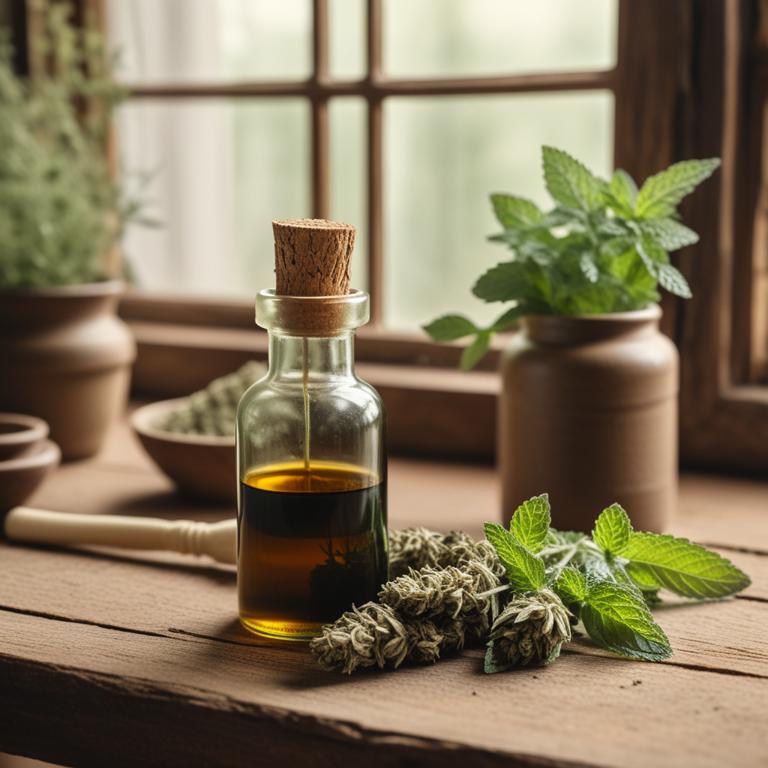
Mentha x piperita tinctures have been traditionally used to treat bad breath due to their antibacterial and anti-inflammatory properties, which help to reduce the growth of oral bacteria and soothe swollen gums.
The bioactive constituents present in these tinctures, such as menthol, menthone, and limonene, exhibit antimicrobial and antioxidant effects, thereby inhibiting the production of volatile sulfur compounds responsible for halitosis.
By using Mentha x piperita tinctures, individuals can benefit from a reduction in bad breath, improved oral hygiene, and a fresher, cleaner mouth.
Regular use of these tinctures can also promote overall oral health and confidence, making them a valuable natural remedy for treating bad breath.
Related Study
According to "Avicenna journal of phytomedicine", Mentha x piperita tinctures for bad breath may be effective in inhibiting the formation of oral bacteria biofilm formation, as the essential oils of Mentha piperita, along with Salvia officinalis and Lippie citriodora, were able to remove the biofilms created by the studied bacteria.
5. Melissa officinalis tinctures
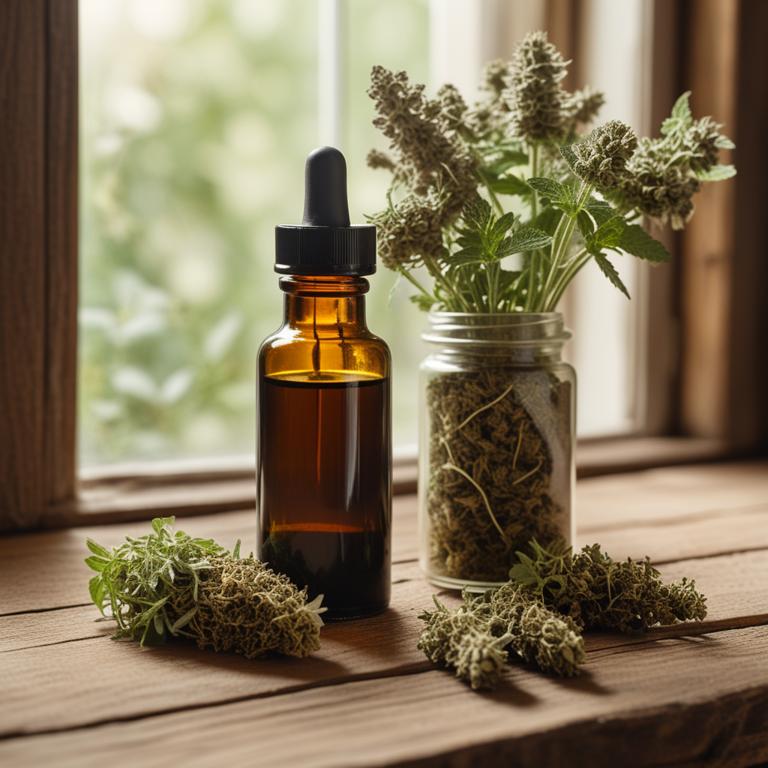
Melissa officinalis tinctures have been traditionally used to treat bad breath, also known as halitosis, due to their antibacterial and anti-inflammatory properties.
The herbal preparation helps to treat this ailment by reducing the growth of bacteria in the mouth, thereby minimizing volatile sulfur compounds that cause bad breath.
The bioactive constituents of Melissa officinalis tinctures, including rosmarinic acid and ursolic acid, contribute to its antimicrobial and anti-inflammatory effects, which are beneficial in treating bad breath.
Regular use of Melissa officinalis tinctures can help to prevent the occurrence of bad breath and provide relief from its symptoms, promoting overall oral health and well-being.
6. Origanum vulgare tinctures
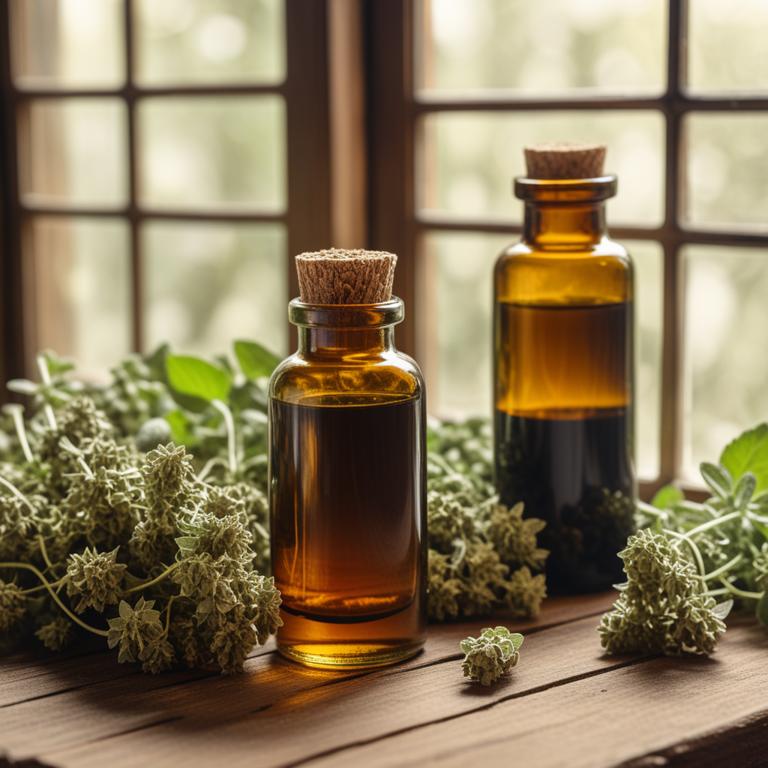
Origanum vulgare tinctures have been traditionally used to treat bad breath, also known as halitosis, due to its antimicrobial and anti-inflammatory properties.
This herbal preparation helps to treat bad breath by reducing the growth of bacteria in the oral cavity and relieving inflammation in the gums and mouth tissues.
The bioactive constituents of Origanum vulgare tinctures, including carvacrol and thymol, exhibit potent antimicrobial activity against the bacteria that cause bad breath, such as Streptococcus and E. coli.
Regular use of Origanum vulgare tinctures can help to alleviate bad breath, reduce plaque and gingivitis, and promote overall oral health and well-being.
Related Study
According to "PloS one", Origanum vulgare tinctures for bad breath may be effective due to their antimicrobial properties, particularly as Porphyromonas gingivalis and Parvimonas micra were highly susceptible to O. vulgare with a minimum inhibitory concentration (MIC) of 0.30 mg ml-1.
7. Eucalyptus globulus tinctures

Eucalyptus globulus tinctures have been traditionally used to treat bad breath, also known as halitosis, due to their antimicrobial and anti-inflammatory properties.
The tinctures help to treat this ailment by reducing the growth of bacteria in the mouth, which can cause bad breath, and by soothing the gums and mucous membranes, thus reducing inflammation and discomfort.
The bioactive constituents of Eucalyptus globulus, including eucalyptol, limonene, and cineole, contribute to its antimicrobial and anti-inflammatory effects, making it an effective remedy for bad breath.
The benefits of using Eucalyptus globulus tinctures to treat bad breath include natural and non-invasive relief, reduced risk of side effects, and improved oral health.